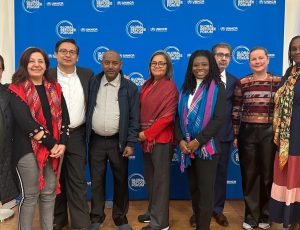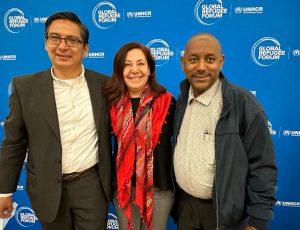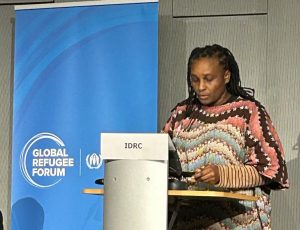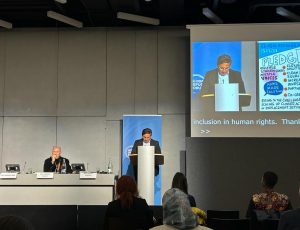Last week, it was my privilege to accompany the twelve IDRC Research Chairs on Forced Displacement to the 2023 Global Refugee Forum (GRF) in Geneva. Organized by UNHCR, the goal of the GRF is to get member states to make pledges to help refugees, both within their countries and abroad. In the past, the role of refugees, displaced persons, stateless persons, academics, non-governmental organizations, and others has been very much relegated to second place compared to states, who UNHCR correctly sees as the key to improving global refugee policy. Governments, however, are not very good at coming up with new ideas on their own, and often lack the knowledge and expertise to formulate better policy. In short, an event like the GRF needs to move beyond statements by member states to highlight fresh ideas and perspectives.
This year, UNHCR has clearly recognized this need, bringing hundreds of persons with lived experience to the event and giving them speaking roles, alongside making space for the vital insights and expertise of academia, NGOs and others. The IDRC Research Chairs, however, brought something unique: an academic perspective from the Global South, with a focus on evidence-based research and policy solutions that is often lacking within the NGO and activist communities, and a voice from the regions and countries most affected by displacement, which is often missing from academia. It was this unique combination of authenticity and rigor that really highlighted the power of localized academic networks like the IDRC Research Chairs Network on Forced Displacement
Some highlights included interim Morocco Chair Amal El Ouassif introducing the Chairs Network to outgoing Assistant High Commissioner for Protection Gillian Triggs and explaining what South-South academic research and networking can mean to our collective understanding of forced displacement, as well as how it can be used as tool by UNHCR to find innovative and evidence-based durable solutions, something that is lacking in today’s policy debates. Chair Paula Banerjee met with the UNHCR Statelessness Unit to discuss next steps for the emerging Global Alliance on statelessness, and Chair Nyi Nyi Kyaw moderated an event at the Refugee Impact Hub, on Collaborating with academic partners to advance refugee-led advocacy: Tips, tricks and networks.
Tanzania Chair Opportuna Kweka made an intervention at Academic Workshop on Evidence-based implementation of the GCR: What role for academia?, moderated by IDRC Research Chairs Abebaw Minaye and Luisa Feline Freier, where she discussed the impact that localization can have on the legitimacy and rigor of field research on forced displacement. The workshop allowed for a conversation between the IDRC Research Chairs and the UNHCR de Mello Chairs, along with other academics based in the Global South, providing a unique opportunity for South-South academic exchange.
Thailand Chair Paula Banerjee gave remarks at the High-Level Side Event “Shifting Power,” at which IDRC President Julie Delahanty also spoke. This event, co-organized by the governments of Brazil and Canada, provided a unique forum for Professor Banerjee discussed the need for franker and more open acknowledgement of the role of racism and discrimination in driving forced displacement, and the need to adopt a truly gender transformative lens at every level of research and policy.
Other highlights included Lebanon Chair Fouad M. Fouad speaking at the High-level side event: Middle East and North Africa Solutions, and Chairs Hiram Angel and Opportuna Kweka intervening in two other side events on climate action and localization. Dr. Angel read the Chairs’ Call to Action on Climate Displacement to the room of diplomats and affected persons.
Finally, taking advantage of being able to meet in person, the Chairs had a three-hour brainstorming session, planning for the next phase of the Network, which will include innovative and unique collaborative research. With the Chairs Network stilly in its first year, it was truly amazing to see the impact already felt at the global level, and I know that many actors are looking forward to what the Chairs will accomplish in the next five years, and what an impact they will make at the next GRF.



